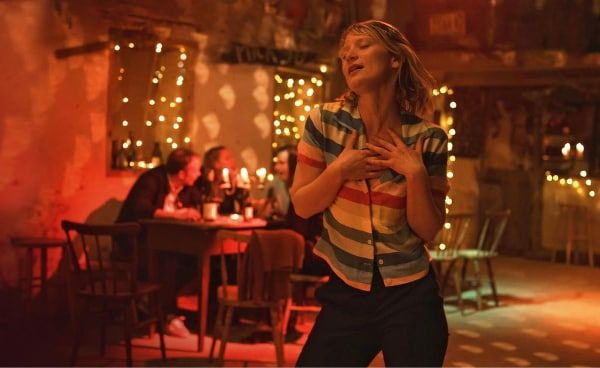Eye For Film >> Movies >> Bergman Island (2021) Film Review
Bergman Island
Reviewed by: Jennie Kermode

The Swedish island of Fårö has a population of just 500, but for some cineastes, it is a place of pilgrimage. A whole industry has been built around those who travel to see the places where Ingmar Bergman once lived and wrote and shot films and had his needs attended to be a succession of wives and mistresses. Mia Hansen-Løve’s meditative drama follows two filmmakers - Tony (Tim Roth) and Chris (Vicky Krieps) – as they go looking for inspiration there and learn uncomfortable things about one another in the process.
On the surface this is simple enough, but intersecting with that story is a second, which follows young director Amy (Mia Wasikowska) as she visits the island for a friend’s wedding, and revisits an old romance. – a complicated business as both she and her former lover are now involved with other people. The characters in this story do not interact in a straightforward way with those in the other. They appear to be Chris’ fictional creations, part of the story she’s developing for her forthcoming film (one in which Tony keeps trying to interfere), but that’s never quite certain. Who is imagining who? Do Chris and Amy exist in parallel spaces? Sooner or later, most writers and filmmakers whose characters become more famous than they do end up wondering who is really more real. Over the course of the film, the women seem to be learning from each other, and it is the men who recede into the background, losing that quality of pre-emininent personhood associated with men of Bergman’s generation.
Through all this, Hansen-Løve asks questions – sometimes directly and sometimes through the way she frames the narrative – about persisting differences in expectations of men and women, in the film industry and beyond. She notes how easy it is for any of us to fall into the roles which have been set out for us, and how easily women can become supporting characters in men’s stories. In one scene, Tony is surrounded by excited fans. Chris, who has no parallel experience, sees something quite different when she looks at him. As the two discuss Bergman, their dialogue reflects shifting cultural perceptions of what it means to ne a great artist, or how the sacrifice or outright suffering of others is factored into that.
Over the course of the film, Chris and Amy’s identities become increasingly blurred. Props and costumes slip between the two worlds. They even begin to look more alike – something which is mostly a product of expression and body language, and is a testament to the actors’ skill. The film unfolds at an easy pace, Hansen-Løve making everything matter of fact and yet beguiling, thereby softening viewers up to accept the fantastic or surreal aspects of the narrative as normal. She leaves us asking what else we accept as normal, and speaks to the value of imagining different lives.
Reviewed on: 06 Mar 2022
















